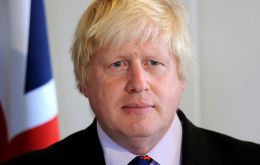MercoPress. South Atlantic News Agency
Economy
-
Tuesday, March 14th 2017 - 11:42 UTC
Brexit bill expected to become law on Tuesday; process to begin end of March

The British Parliament passed on Monday the Brexit bill, paving the way for the government to trigger Article 50 so the UK can leave the European Union. Peers backed down over the issues of EU residency rights and a meaningful vote on the final Brexit deal after their objections were overturned by MPs. The bill is expected to receive Royal Assent and become law on Tuesday.
-
Monday, March 13th 2017 - 18:52 UTC
Airbnb raises US$ 1 billion to expand operations; company valued at US$ 30bn

Airbnb has raised around US$1bn in a funding round to expand its operations, the San Francisco- based start-up revealed in a SEC filing last Thursday. The Series F funding round commenced in June 2016 and by September last year it had managed to raise about US$550m. Investors such as Alphabet's venture capital arm GV, had then purchased stake in the start-up for US$105 per share.
-
Monday, March 13th 2017 - 14:40 UTC
Federal Reserve expected to raise interest rate on Wednesday

Robust hiring by United States employers in President Donald Trump's first full month in power, along with rising wages, have economists tipping a faster-than-anticipated cycle of interest rate increases by the US Federal Reserve, beginning this week.
-
Monday, March 13th 2017 - 12:11 UTC
A third of Argentina's population live in poverty, according to the Catholic Church

Argentina urban poverty rate rose to 32.9% in the third quarter of 2016, which means 13 million people due to a precarious labor market and lack of long-term development policies, according to a report presented last week by the Social Debt Observatory from the Argentine Catholic University (UCA).
-
Monday, March 13th 2017 - 08:39 UTC
UK's £50bn Brexit “divorce bill”: follow the example of PM Thatcher, says Boris

Boris Johnson has told the BBC that Britain should reject any EU demands for a £50bn “exit bill” and follow the example of former PM Margaret Thatcher. It has been reported that EU negotiator Michel Barnier has said the UK must continue to pay into the EU until 2020.
-
Friday, March 10th 2017 - 08:03 UTC
UK calls on 30 Commonwealth countries for a post-Brexit trade network

British trade minister Liam Fox has urged ministers from more than 30 Commonwealth countries to resist “seductive” trade protectionism on Thursday, eyeing the network of mostly former colonies as a way to boost post-Brexit trade.
-
Thursday, March 9th 2017 - 23:27 UTC
US employment balloons during February with strong impact on construction and manufacturing

United States companies added jobs at a great pace in February, with a notable shift away from the service-sector positions that have dominated hiring for years, according to a report released this week. Employment in the private sector surged by 298,000 for the month, with goods producers adding 106,000, ADP and Moody's Analytics said. Construction jobs swelled by 66,000 and manufacturing added 32,000.
-
Thursday, March 9th 2017 - 21:41 UTC
Brazil denies plans to raise taxes on forex transactions to help meet fiscal target

Brazil's central bank and finance minister denied a report that the government could raise taxes on foreign exchange transactions to help reach this year's fiscal target. Bloomberg News had reported the move was “among the options being considered” by the Brazilian government to meet its fiscal target, citing a source with direct knowledge of the issue.
-
Thursday, March 9th 2017 - 13:55 UTC
Temer launches 55 infrastructure projects to boost private investment and create 200.000 jobs

Brazil's President Michel Temer launched an infrastructure concessions program on Tuesday that he said should raise 45 billion Reais (US$14.43 billion) in investment in building and operating roads, port terminals, railways and power transmission lines. Temer said the program was key to restoring an attractive business environment as Brazil struggles to emerge from its worst-ever recession.
-
Thursday, March 9th 2017 - 11:32 UTC
Brazil's fertilizer market picks up strongly as sowing area expands

Brazil's fertilizer market, having recovered to set a fresh all-time high last year, will expand further in 2017, Fertilizantes Heringer said, as it unveiled a jump in corn nutrient volumes, but a fallback in sales to coffee growers.
